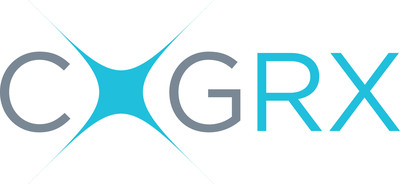Society for Neuroscience 2016 Annual Meeting Nanosymposium Explores Potential Of "Sigma-2/PGRMC1 Receptor Function In Disease And Therapeutics"
PITTSBURGH, Nov. 30, 2016 /PRNewswire/ -- Susan Catalano, Ph.D., founder and CSO of Cognition Therapeutics, Inc., (CogRx) a clinical stage neuroscience company focused on the development of innovative therapeutics for the treatment of Alzheimer's disease and other neurocognitive disorders, chaired the Nanosymposium titled "sigma-2/PGRMC1 Receptor Function in Disease and Therapeutics" at the recent Society for Neuroscience 2016 Annual Meeting in San Diego, California.

Focused on the role of the sigma-2 receptor and its relationship with the protein PGRMC1 in the neurobiology of health and disease, the Society's second Nanosymposium on this topic brought together leading researchers to present their latest work and address controversies in this emerging field. "The progress since last year has been remarkable," said Dr. Catalano. "The field is clearly at a critical point in its growth. It is exciting to see how CogRx's discovery of the central role that sigma-2 ligands and the PGRMC1 protein in Alzheimer's disease have played a key role in stimulating this progress."
The Nanosymposium featured ten presentations focused on the functional roles and regulation of the sigma-2 receptor and the protein PGRMC1, as well as reviewing evidence for sigma-2/PGRMC1 ligands as therapeutics. "The sigma-2 receptor is an under-appreciated protein," said co-chair Dr. Bob Mach, Britton Chance Professor of Radiology, Perelman School of Medicine at the University of Pennsylvania. "Initially characterized as a biomarker of proliferation and quiescence in cancer cells, CogRx's identification of the sigma-2/PGRMC1 pathway as a key mediator in the pathogenesis of Alzheimer's disease clearly demonstrates its importance not only in the fields of oncology and neuroscience, but in cell biology in general." Dr. Meharvan Singh, Dean of the Graduate School of Biomedical Sciences, Professor of Pharmacology and Neuroscience and Interim Director of the Center for Alzheimer's and Neurodegenerative Disease Research at UNT Health Science Center agreed. "The impact of this Nanosymposium will be to shape the development of more effective treatment strategies for such devastating diseases as Alzheimer's disease."
Sigma-2 receptors have been implicated as therapeutic targets for central nervous system disorders such as schizophrenia, anxiety, depression, pain and addiction for over two decades, and small molecule ligands at this receptor exhibit diverse phenotypes depending on the cellular signaling context. The PGRMC1 protein plays a role in plasma membrane localization of several receptors and mediates some of progesterone's neuroprotective effects, as well as the processes of autophagy, cholesterol synthesis and metabolism and axon guidance. The linkage between the two in health and disease is just beginning to be described. "This Nanosymposium provided a wonderful overview of very interesting new neurobiology," said Dr. Timothy Kennedy, Professor in the Department of Neurology and Neurosurgery, McGill University. "The advancement of Cognition's drug to clinical trials treating Alzheimer's patients has clearly galvanized the field. The existence of disease-relevant small molecule ligands that could be used to probe PGRMC1's functions is a potential game changer. This is welcome progress for a protein that promises to play a major role in the neurobiology of development and synaptic plasticity."
About CT1812 and Cognition Therapeutics
Cognition Therapeutics was the first company to identify sigma-2/PGRMC1 as a key protein mediator of beta amyloid oligomer-induced synaptic dysfunction and cognitive deficits in Alzheimer's disease models. These discoveries are described in two companion papers published in 2014 [Izzo et.al] regarding the sigma2/PGRMC-1 receptor. Using Cognition's proprietary biology and chemistry platforms, Cognition defined the central role that sigma-2 ligands and the PGRMC1 protein have in Alzheimer's disease and demonstrated that the selective antagonism of the sigma-2 receptor holds the promise of both treating symptoms and halting disease progression in humans.
CT1812 is a proprietary first-in-class, orally available, highly brain-penetrant small molecule that targets and displaces toxic beta amyloid (A) oligomers from their binding site at neuronal synapses. The molecule more specifically and effectively engages the pathological ligand responsible for Alzheimer's cognitive decline, in contrast to the monoclonal antibody class of Alzheimer's therapeutics directed against multiple structural forms of the Abeta protein. CT1812, which was designed by Cognition's scientific team led by co-founder and CSO Susan Catalano, Ph.D., has been shown in multiple Alzheimer's disease models to stop memory loss. Cognition and its scientific collaborators have generated a growing body of evidence that supports this disease-modifying potential.
Cognition Therapeutics recently announced the administration of the first dose in their Phase 1b clinical trial of CT1812 in mild to moderate Alzheimer's disease. In the Phase 1b Study COG0102, patients with mild to moderate Alzheimer's disease will be randomized to one of two doses of CT1812 (280mg patients or 560mg) or placebo, and dosed for 28 days to help evaluate the safety, tolerability and pharmacokinetic profile of CT1812. Cognition has previously conducted Phase 1a single and multiple ascending dose studies in 94 healthy volunteers, 74 of whom received CT1812. Study COG0102 (https://clinicaltrials.gov/show/NCT02907567) is supported in part under Award Number RF1AG054176 from the National Institute on Aging of the National Institutes of Health.
Cognition Therapeutics (CogRx) is a privately held biopharmaceutical company whose disease-relevant screening and novel chemistry platforms have produced a pipeline of disease modifying small molecule drug candidates which are being developed to treat Alzheimer's disease and potentially other neurocognitive disorders. Additional information about Cognition Therapeutics, Inc. may be found online at http://cogrx.com/.
Forward-Looking Statements
This press release contains "forward-looking statements" concerning the development and commercialization of CogRx's products, the potential benefits and attributes of such products, and CogRx's expectations regarding its prospects. Forward-looking statements are subject to risks, assumptions and uncertainties that could cause actual future events or results to differ materially from such statements. These statements are made as of the date of this press release. Actual results may vary. CogRx undertakes no obligation to update any forward-looking statements for any reason.
Contact:
Diane Pearson
irpr@cogrx.com
(412) 626-7670
Logo - http://photos.prnewswire.com/prnh/20161027/433571LOGO
To view the original version on PR Newswire, visit:http://www.prnewswire.com/news-releases/society-for-neuroscience-2016-annual-meeting-nanosymposium-explores-potential-of-sigma-2pgrmc1-receptor-function-in-disease-and-therapeutics-300370465.html
SOURCE Cognition Therapeutics, Inc. (CogRx)

